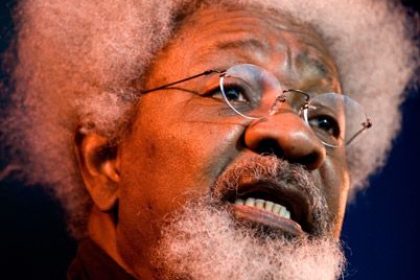
Prof. Wole Soyinka, a Nobel laureate, characterised corruption as a fatal cankerworm on Friday that devastates great nations and greatly disadvantages the populace.
According to Soyinka, it will remain hard to defeat the nation’s growing corruption problem in the absence of a shift in mindset and everyone’s willingness to start acting morally.
The eminent academic revealed this during the 26th Wole Soyinka Lectures, which were hosted by the National Association of Seadogs, also referred to as Pyrates Confraternity, in honour of Soyinka’s 90th birthday. Soyinka and six other University of Ibadan undergraduates formed the organisation in 1952.
“The Baby or the Bathwater: Navigating The Dark Tunnels of Systemic Corruption to Nationhood” was the theme of the talk that was given at the June 12 Cultural Centre in Kuto, Abeokuta. In response to a speech given by Mr. Babatunde Fashola, the former governor of Lagos State, Soyinka stated that corruption is a problem that affects Nigerians at all levels of society.
The guru went on to say that the only way to stop its fatal march over the nation is for every citizen to make the decision to change for the better. “Corruption is the specific aspect of this lecture that struck me,” he remarked. Not only may corruption occur when money is exchanged, but it is a cankerworm that eats away at society’s foundation and taints our basic existence and nature.Additionally, a portion of the talk focused on how corruption can be cured within. Yes, we can discuss government and institutions, how power is unfairly and disproportionately used against the rest of the community, and how corruption is a part of all of that, but in the end, any short-term, immediate, or long-term solution must start from the inside, which was one of the driving forces behind the founding of Pyrates Confraternity 62 years ago.
By addressing myths about Pyrates Confraternity, Soyinka also used the platform to dispel public prejudices. She claimed that the organisation was established to promote justice and the nation’s advancement rather than being a murderous covert cult.
As the association’s primary mission is to advance social justice and good governance, he praised the members for hosting the event and asked them to keep up the excellent work.
Later, Soyinka and Chief Emeka Anyanwu, the former Secretary General of the Commonwealth, released a book titled “Ship Ahoy,” which chronicled the fraternity’s 60-year history.
Earlier in the lecture, Mr. Babatunde Fashola, the former two-term Minister of Works and Housing, said that Soyinka was a gift to the continent, the nation, and civilisation as a whole.
It is unethical to be corrupt, says Fashola
Speaking on the topic of the lecture, Fashola argued that although corruption that results in financial gain is unquestionably wrong, the worst kind of corruption is when it subverts our moral principles and taints people’s way of life.
Earlier in the lecture, Mr. Babatunde Fashola, the former two-term Minister of Works and Housing, said that Soyinka was a gift to the continent, the nation, and civilisation as a whole.
It is unethical to be corrupt, says Fashola
Speaking on the topic of the lecture, Fashola argued that although corruption that results in financial gain is unquestionably wrong, the worst kind of corruption is when it subverts our moral principles and taints people’s way of life.
“The Federal Road Safety Corps used to provide me with copies of the monthly reports on traffic accidents when I served as a minister in office. The reports are actually intended for the Secretary General of the Federation’s office.
“A total of 1111 traffic accidents were reported nationwide in October 2022; of those, 449 resulted in death, accounting for 6% of the 6458 persons involved, while 2780 caused injuries. The data indicated a 3% decline from the previous month but a 10% increase from the October 2021 figure, according to the research.
“This shows that there are 400 fatal traffic crashes in the nation on average each month, but I doubt that the nation’s persistently high level of insecurity—which is a problem during elections—is to blame for such a high death toll.”
He claimed that additional investigation revealed that 51.7 percent of the accidents were caused by speed infractions, 15% by exhaustion, 5.8 percent by sign regulation breaches, 5.4 percent by unsafe driving, and 4.5 percent by route violations.
According to Fashola, 469 automobiles, or 29.5%, of the 1613 total vehicles involved in the collision were cars, and 66% of these cars were being used for business.
The former governor maintained that people’s disregard for following traffic laws stems from a corruption of morals rather than poor road conditions, which is why the carnage on our roads has continued unabated.
“These are all corruptions that are making the slaughter on our roads continue,” he said, adding that “many people don’t even know the highway codes, they don’t drive with a certificated driver’s license, many don’t even know that the road is a shared asset, many don’t give regard to the speed limit.”
As a solution, Fashola stated, “To stop this disturbing waste of life and property, people must embrace attitudinal change, they must embrace recertification of their driver’s license and training, and people must respect the traffic rules.”
In order to instill a culture of road safety in future generations, the former Minister further insisted that road safety be included in the curricula of primary and secondary schools. In fact, it is one of the topics that applicants must pass in order to be admitted.
Capn. Abiola Owoaje, the Chairman of the National Association of Seadogs, praised Soyinka for his steadfastness and for standing up to all forms of injustice against humanity in his welcome speech.
Owoaje remarked that the yearly lecture has developed into a respectable forum for proponents of strong leadership, responsible governance, and social justice, while also wishing the Nobel Laureate a more successful year. The three worthy winners of the Wole Soyinka Leadership Awards were also given their awards at the occasion.

